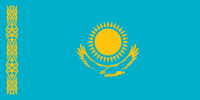Report highlights plight of Kyrgyz forced laborers in Kazakhstan
Rédigé par admin - - aucun commentaire
A detailed report by an international human rights organization has documented how migrants from Kyrgyzstan searching for work in neighboring Kazakhstan are frequently falling prey to forced labor and have become targets of mounting discrimination.
In the report published on June 27, the International Federation for Human Rights, or FIDH, urged Kazakhstan to clamp down on practices enabling slave labor, such as employers retaining passports and illegally threatening to deduct wages, and to take more measures to put a halt to the trafficking of persons.
According to research done by the rights group, up to 150,000 Kyrgyz citizens were registered in Kazakhstan at the end of last year. Many settle in the south of the country for work, using the opportunity as a stepping stone on the way to a more popular destination, Russia.
Kyrgyz nationals are allowed to remain Kazakhstan for 30 days at a time and can stay beyond that period without leaving and re-entering if they are properly registered. They may work without permits but need that registration to conclude formal employment contracts.
The procedure can be complicated, time-consuming and often requires the payment of bribes, however, so laborers are often compelled to accept cash-in-hand jobs. This uncertain status leaves those workers at the mercy of corrupt officials and unscrupulous fixers.
In a scenario outlined by the FIDH, Kyrgyz laborers respond to job advertisement in their home nation and then cross the border under the supervision of intermediaries. These fixers will often hold onto their passports, offer to secure registration and offer legal services against payment. The newly arrived workers are sent to building sites without getting back their passports. Lacking money and documents, the workers are then prone to exploitation from employers who decline to pay salaries in the full knowledge that local authorities will likely be unsympathetic to the pleas of unregistered foreign laborers.
This situation can sometimes continue for several years.
The FIDH report also expressed concerns about detention centers reserved for foreign nationals who have been found to have overstayed the legally permitted period without registration. Rights defenders say the conditions in the centers is typically poor.
“At the special center at 110 Lobachevsky Street in Almaty, I witnessed how migrants from Uzbekistan and Kyrgyzstan were held the entire time outside, in the open air, in both the rain and under the blazing sun. They are only inside at night and they sleep on the bare floor. Forty to fifty people are held in small cells,” said Galym Ageleuov, president of Liberty NGO, which was involved in researching the issue.
The status of Kyrgyz laborers in Kazakhstan should by rights have been a more certain after Kyrgyzstan’s accession to the Eurasian Economic Union in 2015.
The Moscow-dominated bloc ostensibly ensures considerable levels of free movement and labor for citizens of member states.
But all semblance of intra-union accord was severely undermined by a row between Kazakhstan and Kyrgyzstan last year. The outbreak of diplomatic hostilities led to major hold-ups for Kyrgyz people wishing to cross the land border to the north.
Even long-time Kyrgyz residents in Kazakhstan were summoned to police stations for random document checks. Although ties have improved considerably since President Sooronbai Jeenbekov came to power in Bishkek with an implied commitment to avoiding the confrontational behavior of his predecessor, not all the issues have been resolved.
“Many people still mistakenly think that the situation on the Kyrgyz-Kazakh border has been resolved, that there are no problems. That is just not true. No, you won’t see a long column of cars stretching from the border, but all the previous problems are still there,” said an unnamed representative for long-haul truckers from Kyrgyzstan cited by the FIDH.
Originally published by EurasiaNet.org. Copyright © eurasianet
